
AUGUST 2004
one SUNDAY IN JULY 2004
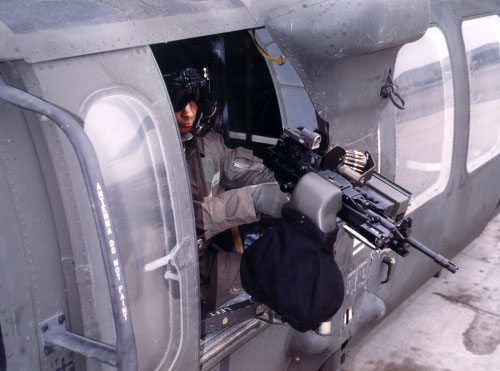
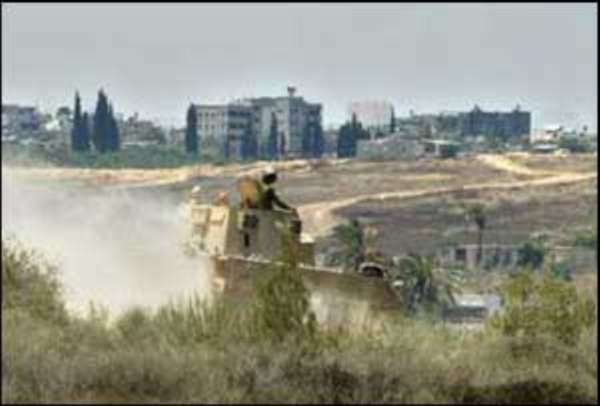
Israeli Occupation Forces Kill and Wound Palestinians, Bulldoze Fields, Destroy infrastructure in Various Towns and Camps
PALESTINE, July 18, 2004 (IPC + WAFA)--
The Israeli occupation
forces (IOF) killed and wounded yesterday Palestinian
inhabitants in both the West Bank and Gaza Strip towns,
and continued military aggression on Beit Hanoon.
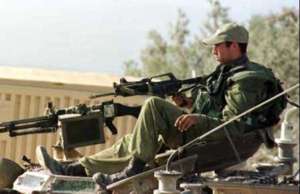
Yasser Tantawi, 20, was shot and killed yesterday night after an IOF contingent stormed the Balata refugee camp, east of Nablus, under a barrage of heavy gunfire and tear gas canister shooting, medics and eyewitnesses reported.
Local hospital officials confirmed that Tantawi was hit with several live bullets in different parts of his body, which caused his instant death.
As the IOF entered the refugee camp, scores of local inhabitants confronted with the invading forces, hurling rocks and empty bottles in an attempt to drive the IOF out of their camp. The Israeli soldiers opened their live ammunition and tear gas indiscriminately, leading to the injury of another citizen, whose name was not known.
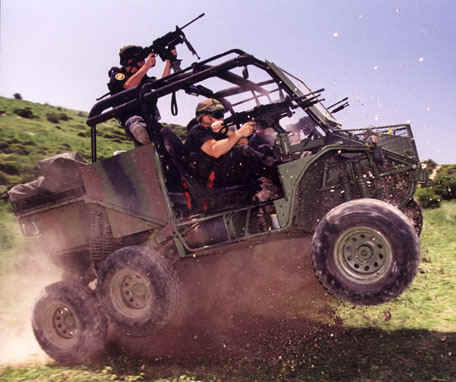 In the meantime, the IOF arrested on
Sunday a youth after storming the Askar refugee camp,
near Nablus, and broke into homes in the Deir Sharaf
Town, an outskirt of Nablus province.
In the meantime, the IOF arrested on
Sunday a youth after storming the Askar refugee camp,
near Nablus, and broke into homes in the Deir Sharaf
Town, an outskirt of Nablus province.
In Qalqilia City, IOF clashed yesterday with scores of citizens and international peace activists in the Ezbat Altayeb Village, who protested the Apartheid Wall construction. A number of participants suffocated due to the poisonous gas, IPC correspondent said
Other Palestinian towns witnessed yesterday the injury by the IOF of other inhabitants such as Salwa Abu Ktaifa, an elderly, of the Gaza Strip town of Dair El-balah, who was shot and wounded in her left shoulder after coming under indiscriminate IOF fire in the Berka neighborhood.
.In the southern Gaza Strip city of Khan Younis, Hammad Baraka, 23, was shot and wounded with a live Israeli bullet near the Almatahen military checkpoint, eyewitnesses told WAFA.
WAFA reported that the IOF, stationed at the said checkpoint, opened their heavy fire abruptly on the adjacent houses, causing the injury of Baraka in the abdomen.
In the border city of
Rafah, south of the Strip, Mohammad Abu To’ama, of
the Al-Salam 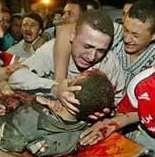 neighborhood, was shot and wounded
with a live bullet in his forehead, then he was
transferred to a local hospital for treatment, security
sources reported.
neighborhood, was shot and wounded
with a live bullet in his forehead, then he was
transferred to a local hospital for treatment, security
sources reported.
The IOF fired heavily yesterday night at the eastern part of the Gaza City, mainly near the Al-Shuhada cemetery, with no causalities reported, security sources said.
Concurrently, the northern Gaza Strip town of Beit Hanoon was still under a tightened Israeli siege for the 19th day consecutively, during which the IOF killed and wounded civilians, demolished homes and devastated properties.
As of yesterday, vast areas
of arable lands including three water wells were
bulldozed completely in the Al-Sultan Abdulhameed Street,
west of the town.
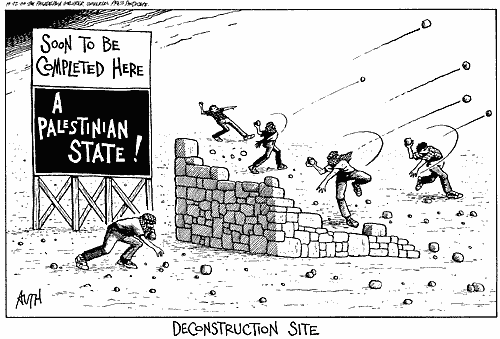
Cartoon Tony
Auth The
Philadelphia Inquirer:this narrow
perspective is precisely the perspective constantly
pushed and promoted by Israeli officials and their
supporters, and Mr. Auth, if nothing else, should be at
least uncomfortable that his cartoons are so much in line
with the official propaganda of a government.www.pmwatch.org
Also, the IOF bulldozers razed olive trees and citrus orchards as well as demolishing a part of a house owned by Hasan Al-Za’aneen, who called on the international community including the human rights organizations, the Red Cross, and the peace lovers to intervene to end their suffering.
The Israeli occupation troops, over the past three weeks, have been gripping military control over the Beit Hanoon Town, killing and wounding several local inhabitants, demolishing homes and destroying infrastructure under the pretext of cracking down on some resistance fighters who launched few home-made rockets on Israeli targets.
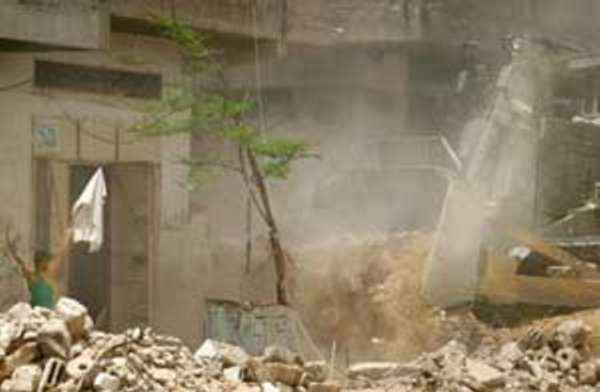
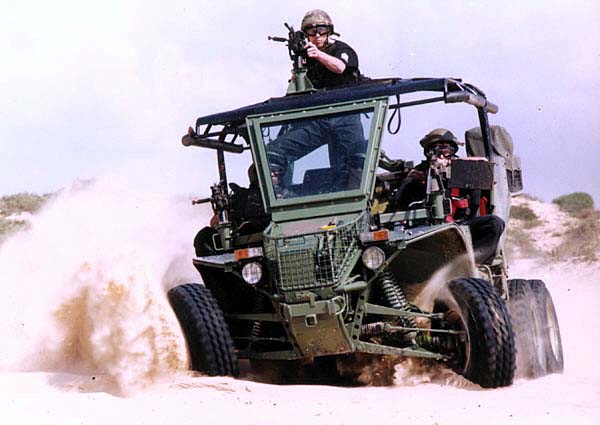
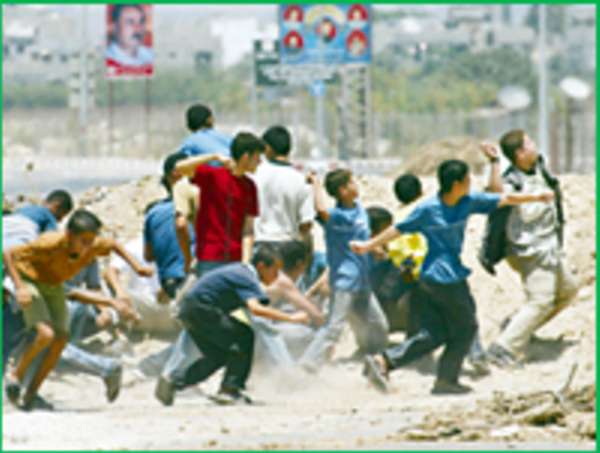
At the check-points
Ha’aretz Thursday, July 22, 2004
By Amira Hass
The soldiers at the Haware checkpoint at the southern
entrance to Nablus shouted commands in Arabic: Rukh
(walk), Wakf (stand), Iftah (open). Dozens of women,
crowded between the rows of cement plates, waited about
half an hour for their turn to be checked. The men stood
in a separate line. The men and women watched silently as
the three soldiers stopped a young man between the cement
plates. Two aimed their rifles at him as the third
shackled his hands behind his back with white plastic
bracelets.
According to military orders, passage is allowed for men
over age 30, and to women. Men younger than 30 were
delayed for hours behind the cement plates - in the sun,
without water. Every young man had his reason for wanting
to get into Nablus or get out of the city. The soldiers
explained that they didn't have entry or exit passes. At
the end of the day some went back the way they came.
Others were allowed through. A day of school or work or
looking for work was wasted.
Every once in a while, because of the alerts, the
checkpoint is closed. The activists from Machsom Watch
reported that last Wednesday thousands of people -
elderly, children, pregnant women - were delayed in the
heavy heat for long hours. A tank stood between the
Palestinians and the soldiers, with its cannon trained on
the civilians.Three women fainted, with one needing
medical treatment. Children cried, exhausted people
shouted Allah Akbar. The soldiers pulled away some young
people they claimed were agitating the waiting crowd. One
was beaten, a second handcuffed, but late that evening
they were released.
The angry crowd moved closer toward the frightened
soldiers, who threw stun grenades to the side of the
road. Just before darkness fell the road was opened, but
only to leave Nablus, for those who live outside the
city. Some 70 detainees, some held since six in the
morning, were only released after midnight. They remained
to sleep over in the Haware mosque.
The eastern checkpoint at Beit Furik, which separates the
village and five other villages, was also hermetically
closed that day. Many residents wanting to go home were
made to wait for hours. Hundreds of people sat on the
ground to wait. They waited. A man collapsed. The mother
of a five-year-old boy dressed in hospital pajamas cried
that he was sick. Children ran back and forth bringing
water from a neighbor's house for the people who fainted
in the heat. The soldiers told the women from Machsom
Watch that they call it, "Time off from life."
There are 12 entrances around Nablus. All are blocked.
Four are manned by soldiers who allow passage on foot by
pedestrians and much more limited transit to vehicles,
until 7:30 in the evening. One out of four of the
entrances, the Awarta checkpoint, is meant for
transporting goods in and out of the city. The rest of
the roadblocks are made up of dirt ramparts, cement cubes
and military jeeps. The roads to those roadblocks are
broken and watched from afar by soldiers.
The siege is a death sentence for what was once the
economic and industrial capital of the West Bank. Until
four years ago, the wholesale fruit and vegetable market
of the city brought into city hall some NIS 3 million a
month. Last month it brought in NIS 33 for the entire
month. Out of 52 factories in town, only 18 remain open,
and they are only semi-productive.
The Palestinians have a lot of ways to overcome their
stolen freedom of movement. There are those who ride
donkeys, others walk for hours. Some plead with soldiers.
Some have parents who make a supreme effort and rent
rooms in the city, so their student children won't lose
any studies at the university. Others manage to get
travel passes - don't ask how - and some find their way
through the olive groves.
there are thousands whose lives shrink into utter
poverty, enforced unemployment, alienation and
disconnection from the surroundings - and enormous rage.
In Israel, people are convinced that the "Time off
from life" of the civilian population deep inside
the West Bank is a legitimate means to prevent terror
attacks.